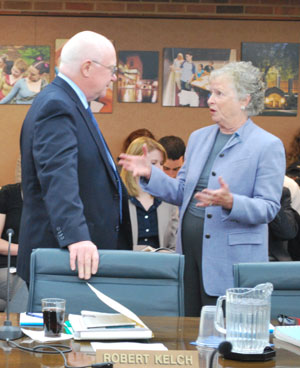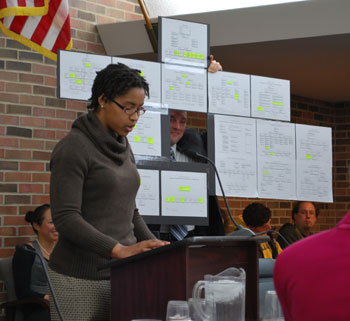Students Press UM on Tuition, Sustainability
University of Michigan Board of Regents (March 19, 2009): Much of this month’s meeting of the University of Michigan Board of Regents was spent hearing from students who were advocating for three issues: A coordinated sustainability effort on campus, a tuition freeze, and UM’s investment in HEI Hotels & Resorts.

UM regent Libby Maynard talks with Bob Kelch, the university's executive vice president for medical affairs, before the March 19 Board of Regents meeting. Kelch is retiring from that position, and his replacement, Ora Hirsch Pescovitz, will be starting the job in May.
In her opening remarks, UM president Mary Sue Coleman praised the performance of several athletic teams, including men’s basketball, hockey, swimming and diving – all were competing at the national level, most notably the basketball team in a NCAA tournament appearance. She said in the midst of this was also sad news about the sudden death of Matthew Hilton-Watson, a 40-year-old UM-Flint professor who collapsed in class and died earlier this month, as well as the death of Bill Davidson, whom Coleman described as a “true gentleman,” philanthropist and exceptional business leader.
Coleman used the reference to Davidson’s business acumen as a segue into announcing that UM will ask employees to share a greater amount of their health care costs. She described employee health care as the university budget’s fastest-growing expense and a threat to its core mission. Details of those changes were released on Friday, the day after the regents meeting.
As is typical of regents meetings, the majority of items on the agenda received little or no comment from regents or administrators. Tim Slottow, the university’s chief financial officer, did not discuss the report on UM’s long-term portfolio except to say that it followed previous trends. (That trend is down: For the fiscal year to day, marketable securities in which UM has invested are down nearly 28%, at $3.088 billion.) Under an item asking regents to authorize the issuance of general revenue bonds to help finance various construction projects, Slottow said that authorization for Build America Bonds or Qualified School Construction Bonds, which are available under the recent federal stimulus package, would give the university more flexibility in its financing options. He said it’s not clear whether those bonds would be more favorable, but if they are, the university would take advantage of them.
Vice president of development Jerry May, in his report on donations to the university, said that two recently completed projects – the new Ross School of Business building and the UM Museum of Art expansion – reflected important partnerships between the university and its donors. Though each of those projects had major donors who contributed millions of dollars, there were hundreds of others who gave support as well. Six hundred donors contributed a total of $33 million for UMMA, and more than 2,500 people helped raise the $110 million for the new business school.
Public comment
Nine students spoke during public comment, each taking the three-minute turn allowed at these meetings.
Arthur Peterson: A graduate student in the Ross School of Business and the School of Natural Resources and Environment, Peterson urged the regents to change UM’s policy regarding proxy voting. As an institutional investor, UM currently has a policy of not voting on social or environmental issues when such issues are put before shareholders. Peterson said he wasn’t advocating for a change in investment strategy. Rather, he wanted UM to join Harvard, Stanford and other peer institutions in using its proxy votes “to integrate our fiduciary duty with our university’s values.” He proposed that UM create an Advisory Committee on Responsible Investment, with membership including students, faculty and administrators. They would initially be charged with setting up voting guidelines, then eventually make recommendations about how to vote on specific issues coming before companies in which UM is a shareholder. [Later in the meeting, regent Martin Taylor asked for a copy of the policy that Peterson had discussed. He asked staff to prepare a report looking at the pros and cons of Peterson's proposal, and said he thought it was time they reviewed the policy.]

UM student Zakiyah Sayyed urges the Board of Regents to create an executive position to coordinate the university's sustainability efforts. The org charg, held by Aaron James, shows how many programs are working on sustainability, but with little or no coordination.
Zakiyah Sayyed: Sayyed’s presentation included a prop that drew laughter from those in the room – a large organizational chart that showed how many programs already exist on campus to support sustainability efforts. (The laughs were in part a response to the student holding the chart, Aaron James, whose smiling face could be seen through a whole in the middle of it.) Her point was to show how dispersed and uncoordinated the university’s current sustainability work is, and to lobby for a new executive position, similar to the executive vice president for medical affairs, that would report to the president and coordinate sustainability programs across all disciplines and functions.
Aaron James: Emerging from behind the org chart, James outlined how the university might pay for the kind of position that Sayyed had described. He said students had learned that some major UM donors were interested in contributing, and suggested that an endowment be started to fund the executive position. James said he realized the approach represented a “somewhat unorthodox appeal from a development perspective,” a comment which also elicited laughter from the regents. James directed his final comments to Coleman, saying that they’d sent her a letter in January signed by more than 1,000 people and were still awaiting her response. “We’re doing our part,” he told her. “We need you to do yours.”

UM student Ashwin Lalendran urged the regents to support a tuition freeze. The yellow ribbon on his left lapel is being worn by students in the "Stop The Hike" campaign. Lalendran likened it to the Maize-Out.
Ashwin Lalendran: Lalendran was the first of four students from the Stop The Hike campaign, an effort to get UM to freeze its tuition costs. He said their goal was to keep the university accessible to all who were qualified to attend, regardless of their socioeconomic circumstances. They were calling for a tuition freeze if state appropriations remained constant. Lalendran said he recognized the challenge in this, but that the university needed to find new, workable solutions. He said he campaign has received widespread support from a diverse number of student groups, including student government and Greek leadership organizations. They had set up an online survey which as of Thursday afternoon had more than 1,700 responses. He said the students attending Thursday’s regents meeting were symbolic of the larger number of students supporting this issue. In response to a query from regent Andrea Fischer Newman, Lalendran said he and other students were wearing yellow ribbons as another symbol of the tuition-freeze campaign, saying it was their version of the Maize-Out. Fischer Newman said that with the “if” in their statement, she thought it was a rational proposal.
Bobby Stapleton: A student from northern rural Michigan, Stapleton said that UM was the only school he applied for, and that his older sisters also attended. But now his family’s food business is in extreme debt, he said. His younger brother has also been accepted at UM, but isn’t telling his parents because he knows they can’t afford to send him. His younger sister doesn’t expect to be able to attend, either. In a state with so many lows, Stapleton said, UM is a point of hope for the state. He and his sisters are going to do everything they can to make sure their siblings have the same opportunity as they’ve had.
Rachel Long: Also speaking about the Stop The Hike campaign, Long said she was a UM sophomore, a co-founder of the Progressive Alliance and a first-generation college student. Her father is an electrician, who now often works out of state because that’s where the jobs are, and her mother is a hairdresser. Long herself has worked two to three summer jobs since high school. She’s paying for tuition with a scholarship and small inheritance from her grandmother. Even so, it’s a struggle to keep up with the costs of housing, textbooks and food. That’s her story, she said, but the student surveys they’re receiving tell of many other struggles, which Long described. One student works three part-time jobs while in school, and finds tuition costs “overwhelming.” Another’s father is about to lose his job, and the student might not be able to afford tuition. Another student’s father makes too much to qualify for financial aid, yet the family has seven children and can’t afford the tuition. Long said she knows that UM values socioeconomic diversity, but that it faces losing its lower- and middle-income students. They need to feel they’re being listened to, she said, and that they have an equal shot at a quality education.
Gibran Baydoun: Baydoun said he’s from Las Vegas, and is paying out-of-state tuition. He comes from a single-parent home, and his mother works two jobs. He said that as a freshman, he was talking with someone in UM’s financial aid office who told him that his best bet would be to attend a different school. If even one student isn’t able to afford UM, he said, “then we have not done our job at sharing that Michigan experience.” Baydoun said the students were committed to working with the university’s leadership to ensure that funding for higher education is a priority in Lansing. After his presentation, regent Denise Illitch asked for a copy of the survey results that the Stop The Hike campaign is collecting, and also asked them to inform regents when they planned to lobby state legislators in Lansing. Regent Julia Darlow thanks all the speakers, saying the information they’d shared was impressive and relevant.
Daniel Braun: Braun began by saying he supported the previous speakers’ positions, but that the privilege of attending UM can’t come at the expense of national and global social responsibility. He is one of the students involved with HEI Workers and Students Together for Justice, a group asking the university to reconsider its $65 million investment in HEI Hotels & Resorts because of the way the corporation treats its workers. He said that in addition to problems in two California hotels, within the past month they’ve learned of similar situation in an HEI-owned Sheraton Crystal City Hotel in Arlington, Virginia. He said that indicates the problem is systemic to the corporate culture. Braun thanked Tim Slottow, UM’s chief financial officer, for providing contact information for Nigel Hurst, an HEI executive. The students sent Hurst a letter asking him to address the company’s anti-union rhetoric and tactics.
Laura Misumi: Picking up on Braun’s comments, Misumi said that Hurst had responded to their letter by saying that HEI was a socially responsible company and had excellent relations with its employees. She said Hurst’s letter was disingenuous and revealed a disconnect between management and workers. He failed to acknowledge or address any concerns that had been raised over the past year, she said. UM needs to turn its financial investment in HEI into a socially responsible investment as well. She urged regents to send their own letters of support to HEI management.
Present: Mary Sue Coleman (ex officio), Julia Darlow, Denise Ilitch, Olivia Maynard, Andrea Fischer Newman, Andrew Richner, Martin Taylor, Kathy White
Absent: Larry Deitch
Next board meeting: Thursday, April 16, 3 p.m. in the Fleming Administration Building, 503 Thompson St., Ann Arbor. [confirm date]



